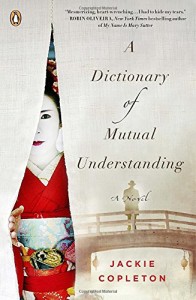I received this book for free from the publisher in exchange for an honest review. This does not affect my opinion of the book or the content of my review.
 A Dictionary of Mutual Understanding by Jackie Copleton
A Dictionary of Mutual Understanding by Jackie Copleton Published by Penguin Books on December 1, 2015
Genres: Historical Fiction
Pages: 304
Format: Paperback
Source: the publisher
Amaterasu Takahashi lost her daughter and grandson to the bombing of Nagasaki. Forty years later, a widow now living in Philadelphia, she opens her door to find a badly scarred man claiming to be her grandson. There were so many things Amaterasu left behind when she fled Japan, and now, with this revelation, she is forced to unlock secrets she had planned to forget forever. She lost so much prior to the bombing, including the trust of her only daughter. Is it possible that her past actions have been absolved, this reunion a penance for all the pain she has suffered. Dare she put hope into believing this man to be her grandson, for fear that rehashing all of these memories will do nothing but remind her of her painful past?
This novel is far more than the description could ever relay, with so many layers history and secrets meant to be forgotten. Amaterasu and her husband lost so much to pikadon (what the locals referred to the bombing of Nagasaki). That’s not the beginning of the long story of pain and loss, however. immediately preceding the bombing, the last conversation with their daughter, was one full of worry and concern. Amaterasu has spent the last forty years living in guilt, for she is the reason her daughter was at that church, it was her fault her grandson was so close to the center of the blast.
Now, with this scarred man standing on her porch, a sealed package of letters serving as proof of his identity, it all comes rushing back, the after-effects of the bomb still resonating. The depth of the secrets Amaterasu is forced to reflect upon his weighty and heart-wrenching, the reader experiencing them for the first time as Amaterasu forces herself to come to terms with them, using them as a point of healing and recovery rather than loss and guilt.
This, like many novels written about this time period, is often times difficult to read. There are regular reflections upon the after-effects of the bombing, graphic detailed used to describe those who survived, even if it was only momentarily. Those of us who read Hiroshima are familiar with these scenes, though this familiarity doesn’t make it any easier. Copleton doesn’t use this graphic imagery without due cause, however, for it is imperative to grasp the full impact of what occurred those four decades previous. If anything, it helps us understand the pain and turmoil Amaterasu felt all this years. Not only the loss of her daughter and grandson, but the losses that transpired previously.
This is a novel that you will read in one sitting, only taking intermittent breaks to rest your heart and soul. This is a book that will be talked about in book clubs, at water coolers, in line at coffee shops. It’s not just a story of loss and recovery, but of love and discovery, a mystery and a war story all combined into one. Thought it seems weighty, it’s also incredibly uplifting, leaving behind a memory that will resonate within the heart of its readers. Highly, highly recommended.





